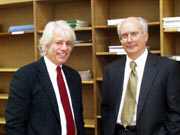The attacks on the World Trade Center may continue to take their toll on people’s mental health for some time. Fear, grief, and numbness are tell-tale signs for mental health experts that a person may be suffering from Post-traumatic Stress Disorder (PTSD), which often begins showing one month after an initial trauma. The symptoms include uncontrollable emotional outbursts, loss of concentration and ongoing depression.
The Jersey City Medical Center used National Depression Screening Day on Thursday to reach out to a public that might still be suffering the consequences of the recent events. According to James McGreath, vice president of behavioral health at the medical center, the day had been planned before the terrorist attack, but the hospital wanted to increase the public awareness of the free screening services available.
On Thursday from 8 a.m. to 6 p.m., mental health professionals waited at the front of the hospital for people to fill out a clinical survey and to direct them to the necessary venue to receive a formal diagnosis from a psychiatrist. Those who filled out the survey were also given literature on depression, grief and PTSD.
Since the attack, the hospital also has received requests for mental health services from approximately 10 families who suffered a loss of a relative in the World Trade Center.
McGreath said that most of the hospital’s assistance has been requested by businesses on the waterfront. The hospital staff delivered 1,200 clinical hours offsite since the attacks and had up to 90 staff members assisting clinical screenings and therapy sessions at businesses in the city.
In addition to the free screening on Oct. 11, the Behavioral Health Center at the hospital offers 24-hour counseling and other mental health services for individuals and organizations.
While McGreath had not expected a large response to the awareness day, he said that he expected an increase in people seeking help as the upcoming holidays approach. "Through the holidays we might expect to see people seeking service," McGreath said. "That’s where they begin to struggle."
According to David Schnur, M.D., who oversaw the National Depression Screening Day, most people who suffer from PTSD begin experiencing symptoms at the initial time of the trauma, and the feelings just linger.
Assisting office employees
Many of the businesspeople being counseled had been placed in Jersey City because of office space lost in the World Trade Center.
Director of the Psychiatric Emergency Screening Service Marguerite Pedley, Ph.D. has been overseeing this mental health assistance on the waterfront for staff at seven companies, who request the counseling through their Employee Assistance Program.
She said that the signs of PTSD she has witnessed are textbook cases of how people react to a traumatic event of this magnitude.
"It is a normal reaction to an abnormal situation," Pedley said, citing instances of people having outbursts of crying, emotional outbursts and a hyper-vigilance.
The treatment of such individuals went as follows: for the first week, staff physicians had employees discuss their stories in group sessions, allowing everyone to get a chance to express what they thought and felt about the events affecting their lives.
"People were talking about the sounds and smells of the event and how long it took them to get in touch with their families," Pedley said. It is important that people who are suffering from PTSD understand that their reactions are normal, Pedley said.
In the second week, the initial shock had subsided and various employees worried that their problems with concentration and controlling their emotions in the workplace would get them in trouble with their employers. During this time, physicians met with people privately and discussed the problems case-by-case.
As a result, Pedley said that staff physicians counseled office managers on what many employees may be going through and creating a sensitive atmosphere.
She also said that managers must exhibit leadership qualities and let the staff know that they understand the human impact of the event.
By now, the counseling sessions have dropped from 13 patients a day to approximately three. "We’ll probably have a phase-out within the next three months or so," Pedley said, "unless a new incident prompts something else."
Those seeking assistance, including free counseling, should call 915-2210.
